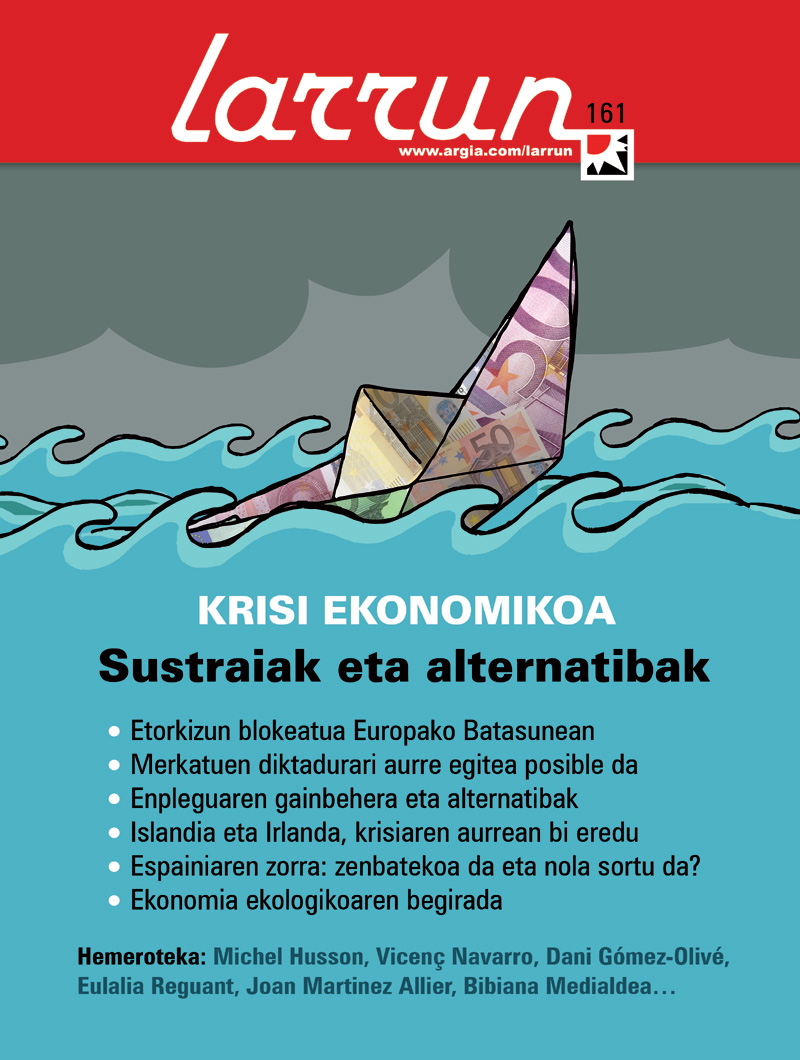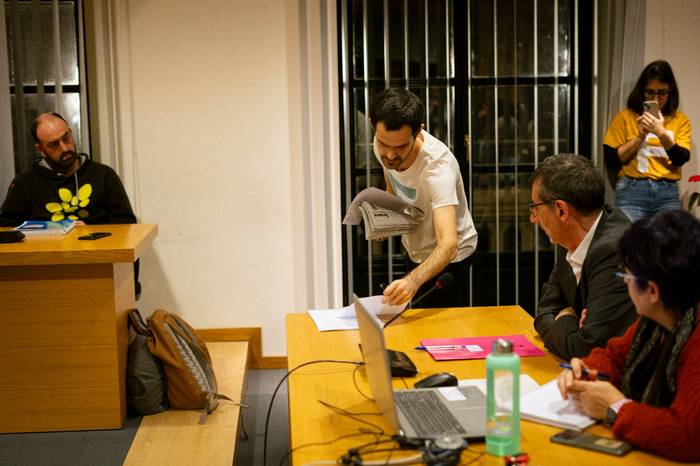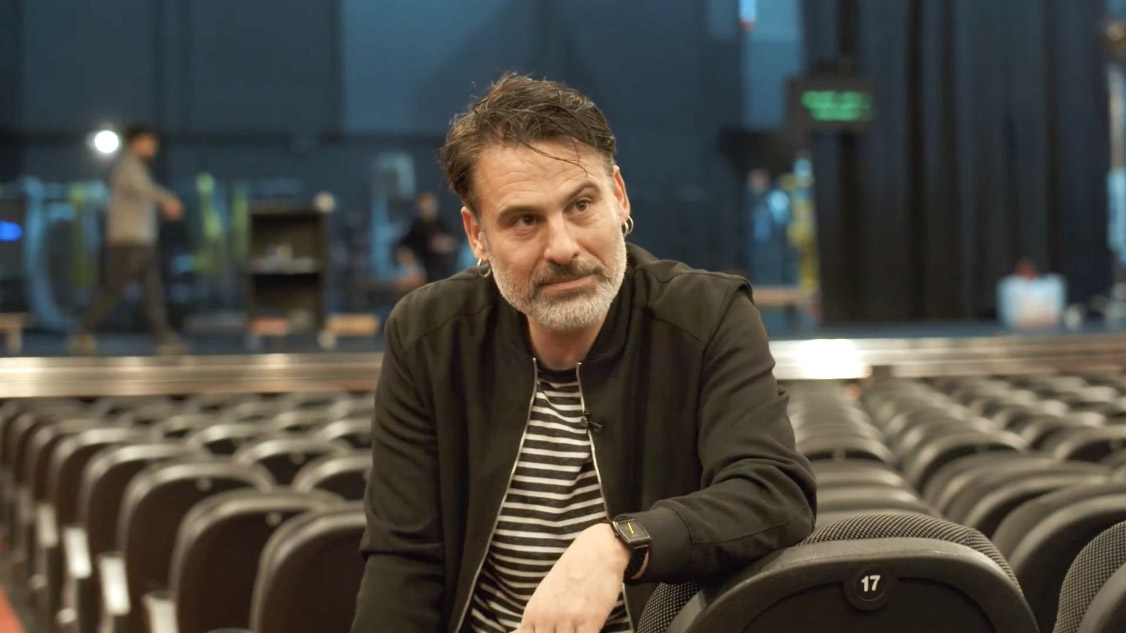Is it possible to cope with the dictatorship of the markets?

Who are the markets and how they govern us (Chapter 10, Icaria/ASACO, 2011).
Although it is often considered impossible, there is the possibility of manoeuvre to manage the solution of the crisis without being subject to the financial powers (“markets”). To do so, however, it would be essential to disobey some of the restrictions imposed in the European Union (the Stability and Growth Pact and the Euro Pact). This disobedience does not have to mean the automatic departure of the common currency. If, however, the solution to the crisis is to be managed democratically and socially, it is essential to begin to recover in part the sovereignty that has been taken away from European citizens in recent decades.
First of all, restoring the centrality of economic decision-making policy is a priority: it must be ensured that the economic management of our resources is carried out through democratic procedures. No other way of managing the crisis can be put in place without dealing in advance with the so-called ‘market dictatorship’. In order to do so, the national and European institutions must be truly democratic and have a duty to serve the social majority rather than the banking and other financial investors. The basic elements of the guidelines to emerge from the crisis must be protected by citizenship. The public deficit ceiling set at a constitutional ceiling is an extreme case. Political parties cannot adopt measures that strongly affect the current and future living conditions of citizens, measures that were not included in the programme in which citizens were able to vote. In such cases, binding consultations should be requested to ensure the protection of measures by citizens. For example, Iceland has shown that the right to decide on basic economic issues such as the present one can be called for.
The other prerequisite for freeing oneself from the unfair authority of financial powers is the acquisition of financing mechanisms that allow states to resort to private investors. The problem is that the State can mobilize enormous resources; the problem is that in recent years it has renounced that capacity.
And it has refused to make concessions to the wealthiest groups of citizens – who have substantially lowered the taxes they paid – and to the banks – which are greatly enriching by financing the states thanks to the resources provided by a public institution (the European Central Bank). Recovering a sound and progressive fiscal policy, a policy that further gravests capital incomes (with less taxes than labour incomes in our country), and a resolute and effective fight against fraud and tax havens, would mean a significant increase in the resources available to the State. This would reduce the need for indebtedness and hence the dependence it currently has on the financial markets.
The recovery of the capacity to mobilize public resources is particularly urgent in the current context, in which the implementation of sound spending programmes well implemented by the State is essential. On the one hand, these public resources should be used to alleviate the social damage caused by the crisis to the most disadvantaged citizens. And, on the other hand, public investment is essential for economic recovery and job creation, channelling our productive model through the principles of social and environmental sustainability.
The management of the currency should also be committed to economic sovereignty. Central banks are needed to take responsibility for citizens and to stop acting as representatives of creditors (banks and other debt agents). Where States need it, the ECB should purchase without prolonging its public debt and with favourable interest rates (contrary to current statutes), rather than offering those reduced interest rates to private banks, which are enriched by financing States at a much higher cost. A responsible central bank must not guarantee a high return on financial assets, as money does by leaving the banks and not the states, but must establish monetary and financial conditions that contribute to the recovery of economic activity and job creation.
Important measures should also be taken in the financial sphere to help increase the room for manoeuvre towards democratic and effective economic management. First of all, strict banking and financial regulation is required. The rules on financial products and operations that operators may carry out must be very precise (known as shadow banking to eliminate financial activities that have no supervision at all), so as to avoid speculative or, quite simply, excessively dangerous activities; it has been confirmed that losses due to excess risk are eventually socialised throughout the population. Faced with the ongoing privatization process, public banks must regain their place, be able to act on long-term and socially useful criteria, and offer reasonable loans to priority economic activities for the change of production model and job creation. This, together with a greater financial capacity of States, would contribute to autonomy from the private financial sector. Finally, measures to control capital movements, both between financial markets and between countries, are necessary to ensure a minimum commitment to the projects that finance such capital and to avoid speculative behaviour.
It is often argued that this is an insurmountable dictatorship of the markets. It is said that if a country were to set up capital controls that would impede speculation or a labour regulation in favour of workers, investors would leave the country and choose more attractive destinations. On the contrary, the EU offers an appropriate situation for such measures. Let us remember that almost 70% of EU countries’ foreign trade is targeted at European countries. The external competition affecting the EU countries is therefore mainly concentrated on the continent itself. That is why the European economic area based on cooperation between partners would be fully viable: in the face of windows with a downward trend — tax cuts, wage cuts, an increase in retirement age, lack of control of financial capital, etc. — an area that operates together and in a coordinated manner, not based on destructive short-term competition with the neighbouring country, could set up totally opposite measures.
In particular, effective economic integration between EU countries would make it possible to establish a model of labour and social rights in line with an upward trend. Concerning the problem of unemployment, working hours (without a reduction in wages) and working life could be reduced, allowing for a fairer distribution of existing jobs (and income). Moreover, a more equitable distribution of paid work would result in a more equitable distribution of unpaid work (household and care work). The minimum wage must be sufficient to ensure a decent standard of living, so it must reach the European level, taking as a reference the highest levels.
Once economic decision-making power has been restored and the current wage competition mechanism in the EU countries has been distorted, it would be possible to change the wage adjustment process, which has been in place for three decades and has deepened in the crisis. In this way, the costs of the crisis would be distributed more equitably, they would be adapted to the culprits and the workers would recover the purchasing power and the economic and social rights that have been cut in recent times. These are the starting points for moving towards a truly democratic society from an economic point of view.
Vagina Shadow(iko)
Group: The Mud Flowers.
The actors: Araitz Katarain, Janire Arrizabalaga and Izaro Bilbao.
Directed by: by Iraitz Lizarraga.
When: February 2nd.
In which: In the Usurbil Fire Room.





















